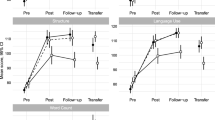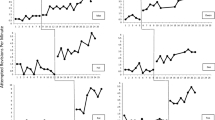Abstract
This study examined the impact of content revising goals on the revising behavior and story writing performance of fourth grade students at-risk for writing difficulties. Twenty-two students (11 boys, 11 girls) were randomly assigned to either a content revising or general revising goal condition. In the content revising goal condition, students revised four stories using each of the following content goals once: revise the story to add another character, set it on the planet Mars, place it 100 years in the future, and change the ending. In the general goal condition, students revised their four stories using a goal to make the paper better. Students wrote and revised a story before (pretest) and after (posttest) these four practice sessions using the goal to make the paper better. Using pretest scores as a covariate, students in the content revising goal condition made statistically more text-level revisions, more text-level revisions that changed meaning, and more text-level revisions rated as improved at posttest when compared to students in the general revising goal condition. The length and quality of posttest stories for students in the two different revising goal conditions did not differ statistically though. The study demonstrated that repeated application of content revising goals resulted in positive and independent changes in students’ revising behaviors. These findings also provide support for Vygotsky’s theory of the zone of proximal development.
Similar content being viewed by others
References
Chanquoy, L. (2001). How to make it easier for children to revise their writing: A study of text revision from 3rd to 5th grades. British Journal of Educational Psychology, 71, 15–41. https://doi.org/10.1348/000709901158370
De La Paz, S., & Sherman, C. (2013). Revising strategy instruction in inclusive settings: Effects for English learners and novice writers. Learning Disabilities Research & Practice, 28, 129–141. https://doi.org/10.1111/ldrp.12011
De La Paz, S., Swanson, P., & Graham, S. (1998). Contribution of executive control to the revising problems of students with writing and learning difficulties. Journal of Educational Psychology, 90, 448–460. https://doi.org/10.1037/0022-0663.90.3.448
Englert, C., Raphael, T., Anderson, L., Anthony, H., & Stevens, D. (1991). Making strategies and self-talk visible: Writing instruction in regular and special education classrooms. American Educational Research Journal, 28, 337–372. https://doi.org/10.3102/00028312028002337
Faigley, L., & Witte, S. (1981). Analyzing revisions. College Composition and Communication, 32, 400–414.
Fitzgerald, J. (1987). Research on revision in writing. Review of Educational Research, 57, 481–506.
Galbraith, D., & Baaijan, V. (2018). The work of writing: Raiding the inarticulate. Educational Psychologist, 53, 238–257. https://doi.org/10.1080/00461520.2018.1505515
Graham, S. (1997). Executive control in the revising of students with learning and writing difficulties. Journal of Educational Psychology, 89, 223–234. https://doi.org/10.1037/0022-0663.89.2.223Actions
Graham, S. (2006). Writing. In P. Alexander & P. Winne (Eds.), Handbook of Educational psychology (pp. 457–478). Erlbaum. https://doi.org/10.4324/9780203874790
Graham, S. (2018a). A revised writer(s)-within-community model of writing. Educational Psychologist, 53, 258–279. https://doi.org/10.1080/00461520.2018.1481406
Graham, S. (2018b). Instructional feedback in writing. In A. Lipnevich & J. Smith (Eds.), The Cambridge handbook of instructional feedback. Cambridge handbooks in psychology (pp. 145–168). Cambridge University Press. https://doi.org/10.1017/9781316832134
Graham, S., Harris, K. R., & McKeown, D. (2013). The writing of students with LD and a meta-analysis of SRSD writing intervention studies: Redux. In L. Swanson, K. R. Harris, & S. Graham (Eds.), Handbook of learning disabilities (2nd ed., pp. 405–438). Guilford Press.
Graham, S., Hebert, M., & Harris, K. R. (2015). Formative assessment and writing: A meta-analysis. Elementary School Journal, 115, 523–547. https://doi.org/10.1086/681947
Graham, S., Hebert, M., Sandbank, M., & Harris, K. R. (2016). Assessing the writing achievement of young struggling writers: Application of generalizability theory. Learning Disability Quarterly, 39, 72–82. https://doi.org/10.1177/0731948714555019
Graham, S., & MacArthur, C. (1988). Improving learning disabled students’ skills at revising essays produced on a word processor: Self-instructional strategy training. Journal of Special Education, 22, 133–152. https://doi.org/10.1177/002246698802200202
Graham, S., MacArthur, C., & Schwartz, S. (1995). The effects of goal setting and procedural facilitation on the revising behavior and writing performance of students with writing and learning problems. Journal of Educational Psychology, 87, 230–240. https://doi.org/10.1037/0022-0663.87.2.230
Graham, S., Schwartz, S., & MacArthur, C. (1993). Knowledge of writing and the composing process, attitude toward writing, and self-efficacy for students with and without learning disabilities. Journal of Learning Disabilities, 26, 237–249. https://doi.org/10.1177/002221949302600404
Graham, S., Harris, K.R., & Mason, L. (2005). Improving the writing performance, knowledge, and motivation of struggling young writers: The effects of self‑regulated strategy development. Contemporary Educational Psychology, 30, 207–241.
Hacker, D. (2018). A metacognitive model of writing: An update from a developmental perspective. Educational Psychologist, 53, 220–237. https://doi.org/10.1080/00461520.2018.1480373
Hammill, D., & Larsen, S. (2009). Test of written language—4. Pro-ED.
Harris, K. R., & Graham, S. (1999). Programmatic intervention research: Illustrations from the evolution of self-regulated strategy development. Learning Disability Quarterly, 22, 251–262. https://doi.org/10.2307/1511259
Harris, K. R., Graham, S., & Mason, L. (2006). Improving the writing, knowledge, and motivation of struggling young writers: Effects of self-regulated strategy development with and without peer support. American Educational Research Journal, 43, 295–340.
Hayes, J. (1996). A new framework for understanding cognition and affect in writing. In M. Levy & S. Ransdell (Eds.), The science of writing: Theories, methods, individual differences, and applications (pp. 1–27). Erbaum.
Hayes, J. (2004). What triggers revision? In L. Allal, L. Chanqouy, & P. Largy (Eds.), Revision: Cognitive and instructional processes (pp. 9–20). Kluwer. https://doi.org/10.1007/978-94-007-1048-1_2
Hayes, J., & Flower, L. (1980). Identifying the organization of writing processes. In L. Gregg & E. Steinberg (Eds.), Cognitive processes in writing (pp. 3–30). Erlbaum. https://doi.org/10.4324/9781315630274
Holliway, D., & McCutchen, D. (2004). Audience perspectives in young writers’ composing and revising. In L. Allal, L. Chanqouy, & P. Largy (Eds.), Revision: Cognitive and instructional processes (pp. 87–101). Kluwer. https://doi.org/10.1007/978-94-007-1048-1_6
Kellogg, R. (1987). Effects of topic knowledge on the allocation of processing time and cognitive effort to writing processes. Memory & Cognition, 15, 256–266. https://doi.org/10.3758/bf03197724
Limpo, T., Alves, R., & Fidalgo, R. (2013). Children’s high-level writing skills: Development of planning and revising and their contribution to writing quality. British Journal of Educational Psychology, 84, 177–193. https://doi.org/10.1111/bjep.12020
Locke, E., Shaw, K., Saari, L., & Latham, G. (1981). Goal setting and task performance: 1969–1980. Psychological Bulletin, 90, 125–152. https://doi.org/10.21236/ada086584
MacArthur, C. (2012). Evaluation and revision processes in writing. In V. Berninger (Ed.), Past, present, and future contributions of cognitive writing research to cognitive psychology (pp. 461–483). Psychology Press.
MacArthur, C. (2016). Instruction in evaluation and revision. In C. MacArhtur, S. Graham, & J. Fitzgerald (Eds.), Handbook of writing research (2nd ed., pp. 272–287). Guilford.
MacArthur, C., & Graham, S. (1987). Learning disabled students’ composing under three methods of text production: Handwriting, word processing, and dictation. Journal of Special Education, 21, 22–42. https://doi.org/10.1177/002246698702100304
MacArthur, C., Graham, S., & Schwartz, S. (1991a). Knowledge of revision and revising behavior among learning disabled students. Learning Disability Quarterly, 14, 61–74. https://doi.org/10.2307/1510373
MacArthur, C., Schwartz, S., & Graham, S. (1991b). Effect of a reciprocal peer revision strategy in special education classrooms. Learning Disabilities Research and Practice, 6, 201–210.
Matsuhashi, A., & Gordon, E. (1985). Revision, addition, and the power of the unseen text. In S. Freedman (Ed.), The acquisition of written language: Response and revision (pp. 226–249). Ablex.
McCutchen, D., Francis, M., & Kerr, S. (1997). Revising for meaning: Effects of knowledge and strategy. Journal of Educational Psychology, 89, 667–676. https://doi.org/10.1037/0022-0663.89.4.667
Midgette, E., Haria, P., & MacArthur, C. (2008). The effects of content and audience goals for revision on the persuasive essays of fifth- and eighth-grade students. Reading & Writing: An interdisciplinary Journal, 21, 131–151. https://doi.org/10.1007/s11145-007-9067-9
Odell, L. (1980). Business writing: Observations and implications for teaching compositions. Theory into Practice, 19, 225–232. https://doi.org/10.1080/00405848009542903
Philippakos, Z., & MacArthur, C. (2016). The effects of giving feedback on the persuasive writing of fourth- and fifth-grade students. Reading Research Quarterly, 51, 419–433. https://doi.org/10.1002/rrq.149
Reynolds, C., Hill, D., Swassing, R., & Ward, M. (1988). The effects of revision strategy instruction on the writing performance of students with learning disabilities. Journal of Learning Disabilities, 21, 540–545. https://doi.org/10.1177/002221948802100904
Sawyer, R., Graham, S., & Harris, K. R. (1992). Direct teaching, strategy instruction, and strategy instruction with explicit self-regulation: Effects on the composition skills and self-efficacy of students with learning disabilities. Journal of Educational Psychology, 84, 340–352. https://doi.org/10.1037/0022-0663.84.3.340
Scardamalia, M., & Bereiter, C. (1983). The development of evaluative, diagnostic and remedial capabilities in children’s composing. In M. Martlew (Ed.), The psychology of written language: Development and educational perspectives (pp. 67–95). Wiley.
Scardamalia, M., & Bereiter, C. (1985). Development of dialectical processes in composition. In D. Olson, N. Torrance, & A. Hildyard (Eds.), Literacy, language, and learning: The nature and consequences of reading and writing (pp. 307–329). Cambridge University Press.
Scardamalia, M., & Bereiter, C. (1986). Written composition. In M. Wittrock (Ed.), Handbook of research on teaching (3rd ed., pp. 778–803). MacMillan.
Shanahan, T. (2016). Relationships between reading and writing development. In C. MacArhtur, S. Graham, & J. Fitzgerald (Eds.), Handbook of writing research (2nd ed., pp. 194–209). Guilford.
Vygotsky, L. S. (1978). Mind in society: The development of higher psychological processes. Harvard University Press.
Author information
Authors and Affiliations
Corresponding author
Additional information
Publisher's Note
Springer Nature remains neutral with regard to jurisdictional claims in published maps and institutional affiliations.
Rights and permissions
About this article
Cite this article
Graham, S., Harris, K.R., Adkins, M. et al. Do content revising goals change the revising behavior and story writing of fourth grade students at-risk for writing difficulties?. Read Writ 34, 1915–1941 (2021). https://doi.org/10.1007/s11145-021-10142-9
Accepted:
Published:
Issue Date:
DOI: https://doi.org/10.1007/s11145-021-10142-9




